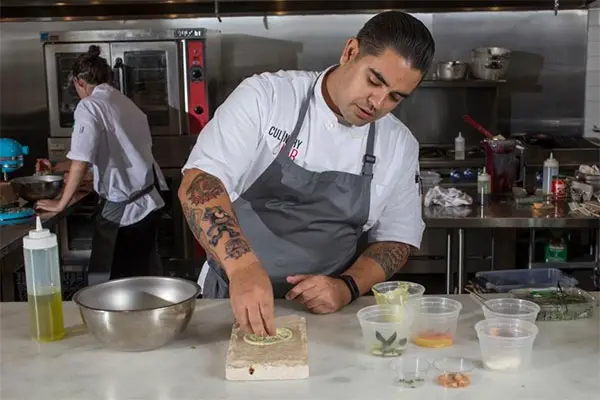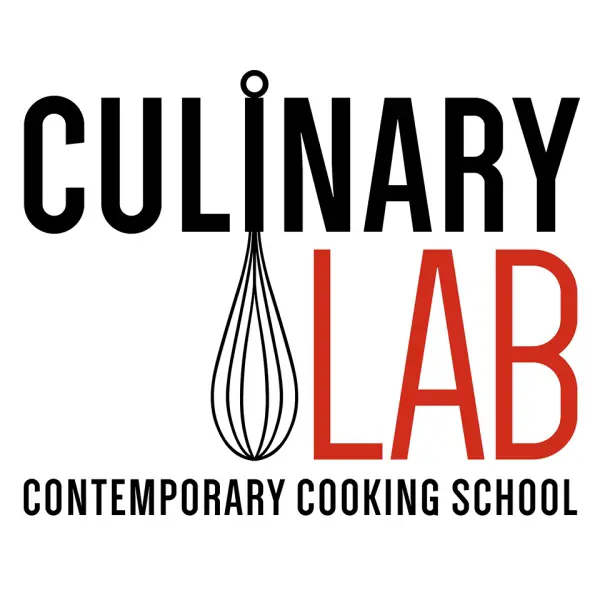CulinaryLab – Tustin
CulinaryLab – Tustin
- Cooking School - Home Cooks
CulinaryLab is a forward-focused cooking school where timeless techniques meet cutting edge curriculum and real-world training to cook up bold contemporary cuisine. CulinaryLab reinvents culinary training with a program that harnesses the power of today's innovations to train tomorrow's culinary arts visionaries. Orange County, Calif-based CulinaryLab is the first school of its kind to combine an industry-fueled curriculum, tech-savvy training, hands-on learning, and a sustainable food philosophy.
________________________________________________________________________
Professional Classes:
Overview of the program(s)
CulinaryLab Cooking School immerses students in an experiential, modern, hands-on education for all levels of cooks looking to pursue a career in culinary or pastry arts. Both of our professional programs train students to be seasoned professionals as quickly and efficiently as possible.
How is the professional program (PP) unique?
-Boring textbooks are replaced with tech-savvy video-driven learning
-No lectures that drag—we’re all about hands-on teaching
-Apprenticeship programs at top local restaurants
-Added value perks like guest chef instructors, engaging field trips, and continuing education via monthly modules on a variety of topics
-We encourage experimentation in a laboratory setting to foster engagement and information retention
What types of skills are learned and how do these skills prepare students for the working environment?
For both Pro Culinary and Pro Pastry, students learn culinary basics (like safety and sanitation, kitchen etiquette, etc.), knife skills and vegetable cookery, and baking and pastry basics.
For Pro Culinary specifically, students learn plant-based cooking, soups/stocks/sauces, meat/poultry/fish fabrication and cooking techniques (sautéing, frying, grilling, braising, roasting, sous vide, etc.), advanced plating and food photography, garden manager, hors-d'oeuvres and buffet design, and international cuisine.
For Pro Pastry specifically, students learn how to make chocolates, breads, ice cream, cookies, laminated doughs, and specialty cakes (including techniques such as tempering, decorating, enrobing, etc.)
Our teaching methodology, our apprenticeship program, guest chefs instructors and ongoing monthly module education(covering topics from entrepreneurship to marketing to fermentation and popular food trends) is what prepares our pro students for the real-world industry and is what makes us unique (like what is mentioned in the previous answer).
How long is the PP?
It depends on how many programs a student decides to enroll in. There are 13 professional culinary programs and 10 professional pastry programs. A student could be attending school anywhere between a few weeks up to a year.
What does the average student spend on their culinary or hospitality education?
It depends on how many programs a student enrolls in, and can range from $740-$2300 for each program. If a student decides to enroll in all 13 pro culinary programs, the cost is $19,050 and for 10 pro pastry programs, the cost is $17,xxx
Who is your prime candidate for the PP enrollment?
A prime candidate for our professional programs is a person who is serious about a career in the foodservice industry, passionate about cooking, hungry and eager to learn, is rigorous and a hard worker, is open to feedback and adapts accordingly, takes direction well, and has a positive can-do attitude. Our pro students are commonly young adults ready to jump into culinary education, or, career changers.
How do you enroll and when?
Prospective students can schedule a tour online or call/email the school any time. Students then begin the application process which involves an online application, Q&A form, English and Math exams, and an interview with Chef Ryan before a decision is made regarding acceptance into the school.
How many applicants do you receive for the PP?
We receive approximately 100 applicants a year.
How many spots are available in the PP?
There are 12 spots available per program per quarter.
Generally, do your students enter jobs right out of school or do they continue with more education?
If our students choose to enroll in the paid apprenticeship program, they will have an overlap of attending school and working in a professional kitchen simultaneously.
Who heads the culinary/hospitality department in the school?
Chef Director & Owner Ryan Wagner
To ask director: what lead them to teaching instead of lead chef or hospitality management position?
Chef Ryan has worked in the industry since he was 15 years old in a number of positions, everything from dishwasher, to line cook, to eventually Executive Chef. He spent many years working at restaurants, in catering, and launching small businesses, and when the opportunity presented itself to try his hand at culinary education, he went for it. After teaching at a traditional school, he identified opportunities to approach culinary education in a more modern progressive way that would better serve both students and restaurant employers. Thus CulinaryLab was born and he truly loves to support students first starting out in the industry to achieve their dreams.
How can the hospitality industry participate? For example, how can they help the school? (Such as internships or guest chef appearances)
We have many restaurant partners in the industry that support our school through guest chef instruction and serve as apprenticeship partner sites for our professional students. We are always looking for experiential teaching opportunities to further enrich our students' learning experience through field trips, behind-the-scenes site visits, etc.
Is there a contact for internships?
If a restaurant is interested in becoming an apprenticeship site partner and hire our students, please contact Lisa Wagner, Director of Student Engagement (714.944.7857| [email protected])
Are your students encouraged to stage? Why or why not?
We always encourage students to take advantage of valuable learning opportunities including staging under great chefs. However, most of our students who seek industry experience apply for our paid apprenticeship program.
If you have a student-run dining location where the public can dine, please describe it including hours and dates of operation?
We do not have a student-run dining location.
Why should the industry hire your graduates as opposed to no schooling and/or grads from other schools?
We vet applicants to ensure that students that enter our programs have a solid understanding and realistic expectations about what it's like to work in our industry. CulinaryLab students know that they are training to be great entry level cooks, not the Next Food Network Star. Through immersive hands-on learning and repetitious practice, our students have the rigor and discipline that sets them up for success in a professional kitchen environment.
Home Cook Classes:
Overview of the program(s)
Once our school moved to its full-time location in September 2016, we saw the opportunity to offer classes to serious home cooks. Our "Culinary School for the Home Cook" classes are a multi-week foundational series format. In these classes, students discover how different ingredients interact, learn from the same experienced chef instructors and use the same professional grade equipment as our pro students, and gain tangible useful skills they can implement immediately.
How is your program unique?
What makes our home cook classes unique is we offer a learning experience that falls between the typical recreational one-off cooking class and professional culinary school.
What types of skills are being taught?
Hands-on fundamental cooking techniques such as knife skills, vegetable cookery, how to make sauces, soups, grains, and hors-d'oeuvres, meat, poultry and fish cooking techniques (sautéing, frying, grilling, braising, roasting, etc.), and plate presentation. In comparison to other typical classes for the home cook, we offer more in-depth training including fabricating a chicken, filleting a fish, and processing live shellfish.
How long is the program?
Our home cook programs range from 10-12 weeks.
Who is your prime candidate for enrollment?
A prime candidate for our home cook series classes is a person who is committed to upping their cooking game, is passionate about cooking, eager to learn, is a hard worker, and has a positive can-do attitude.
How do you enroll and when?
Prospective home cook students can schedule a tour, email, call, or simply stop by between 9-5pm Monday through Wednesday. They can also register for classes directly on our website.
How many spots are available?
There are 12 spots available in each class.
Who heads the culinary department in the school?
Chef Director & Owner Ryan Wagner










